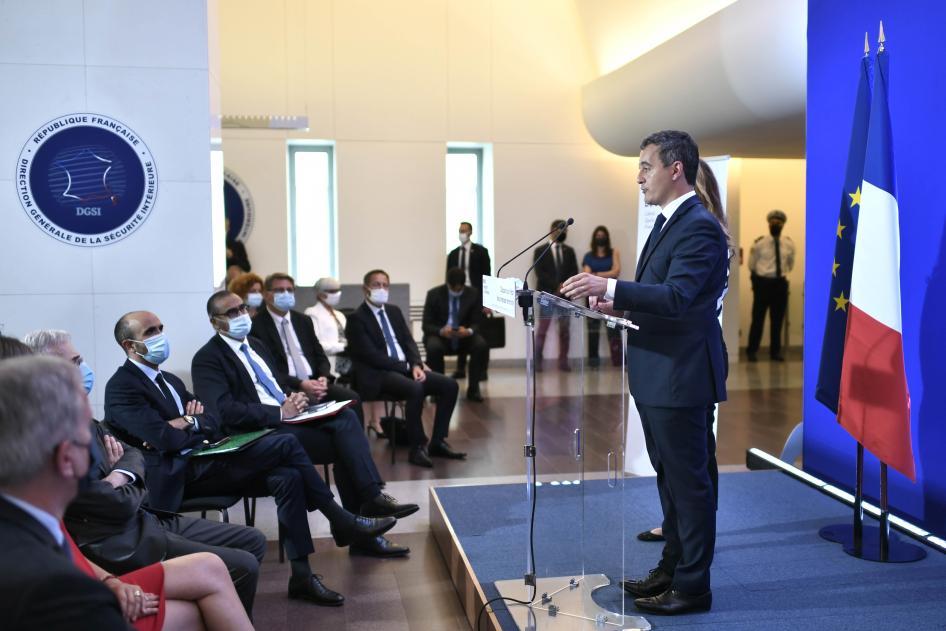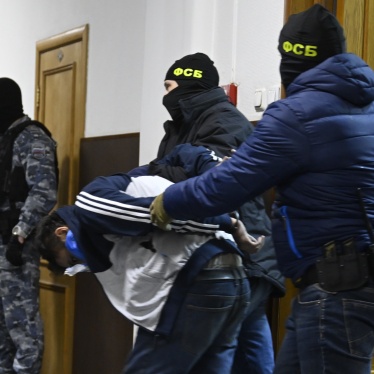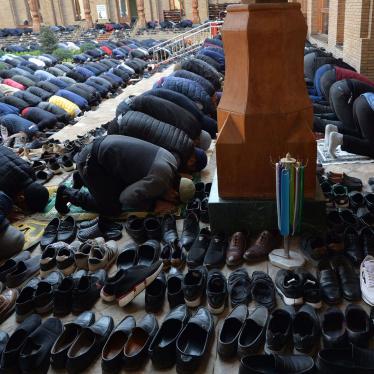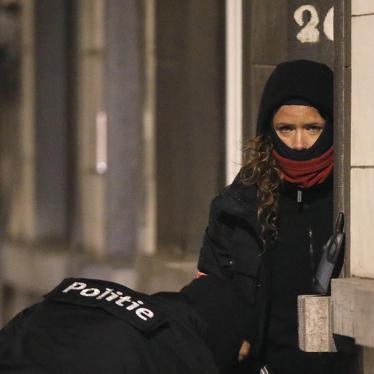(Paris) – The French government’s decision to shut down a leading anti-discrimination group threatens basic human rights and liberties including freedom of expression, association, and religion, and the principle of nondiscrimination, Human Rights Watch said today.
On December 2, 2020, Interior Minister Gérald Darmanin tweeted that the Council of Ministers had notified the Collective Against Islamophobia in France (CCIF) that it was being dissolved by decree.
“Whatever its intention, this measure risks further stigmatizing Muslims in France,” said Kartik Raj, Western Europe researcher at Human Rights Watch. “Shutting down an organization that raises legitimate concerns about anti-Muslim prejudice is blaming the messenger rather than addressing existing discrimination.”
On November 19, Darmanin announced on social media that he had notified CCIF of the government’s intention to shut it down, giving it eight days to challenge the action in an administrative court. In the days that followed, the organization responded to some allegations in the minister’s letter in writing and over social media channels and announced on November 30 that it had already dissolved itself voluntarily and pre-emptively at the end of October. The government said in the December 2 notification that it did not accept the organization’s claim that it has dissolved voluntarily.
A representative of CCIF has confirmed to Human Rights Watch that it intends to challenge the decree in French courts. The organization, she confirmed, had ceased operations and was no longer able to take forward the more than 500 cases on which it had been working.
Using the authority under Article L212-1 of the Internal Security Code, the government alleges that the organization’s activities provoke or propagate theories tending to encourage or justify discrimination, hate, or violence on the basis of a person or group’s origin, ethnicity, nationality, race, or religion and that it has engaged in actions aimed at provoking acts of terrorism in France or abroad. The fact that an organization describes certain counterterrorism measures as Islamophobic should not be equated with spreading or supporting ideas that can give rise to acts of hatred, discrimination, or violence. The reasoning provided in the December 2 decree suggests that the French government’s decision is based on this misguided and dangerous conflation.
Darmanin has in recent months referred to CCIF as an “enemy of the republic” and alleged in a tweet on December 3 that the organization “had consistently carried out Islamist propaganda.” Other government ministers have talked about targeting associations that are “intellectually complicit” with “radical Islamism,” using vague and overbroad concepts like “separatism” and “communitarianism,” putting forward a divisive, aggressive interpretation of laïcité, the French approach to secularism.
Human Rights Watch, alongside other international and French human rights organizations and lawyers, has found the work of CCIF important in documenting the discriminatory impact of counterterrorism measures.
Under international and European human rights law, states can only restrict the rights to freedom of association, freedom of religion and belief, and freedom of expression in a way that is lawful, necessary, and proportionate. Dissolving associations under international human rights law should be a measure of last resort taken because an association advocates a clear, imminent threat of violence or has acted in grave violation of the law, and ideally made by a court.
The European Court of Human Rights has noted that when assessing justification for shutting down an organization, freedom of association and freedom of expression must be considered together, given that “The protection of opinions and the freedom to express them is one of the objectives of the freedoms of assembly and association”. Exceptions to political freedom of association are to be construed strictly; only convincing and compelling reasons can justify restrictions on that right. The European Court has found that absent any call or action by an association or its leaders for the use of violence, armed resistance, or insurrection, it is difficult to justify a sanction as severe as the dissolution of an entire association.
The action against the CCIF is part of a broader crackdown on liberties in response to a spate of recent attacks attributed to Islamist extremists. The government has confirmed that it will seek to expand existing security powers in a draft “Law on Republican Values” scheduled to be presented to the Council of Ministers on December 9.
On November 24, a separate Global Security Bill, which contains worrying restrictions on media freedoms and the rights to protest, expression, and free association, and new police surveillance powers, has been approved by the National Assembly and will soon be debated by the Senate.
On December 3, the interior minister announced that the government would take measures against 76 mosques suspected of “separatism,” closing them if necessary. The controversial Law to Strengthen Internal Security and the Fight Against Terrorism includes broadly worded authority to close places of worship. The law, which incorporated emergency powers into ordinary law, has been in force since France’s two-year-long state of emergency ended formally in late 2017.
In addition to undermining protection of freedoms of opinion, expression, and association, targeting an organization like the CCIF, which works on issues of nondiscrimination, sends a message that France will not tolerate Muslims exercising their civil and political rights to voice concerns and protest injustice on an equal basis as other populations in France. This risks inadvertently assisting the efforts of Islamist armed groups to vilify Western governments.
“The government’s heavy-handed action will make it harder for victims of anti-Muslim prejudice in France to seek appropriate redress and could leave others afraid to complain,” Raj said. “It could also backfire by fueling the narrative that French state policy is anti-Muslim.”
France: Dissolving Anti-Discrimination Group Threatens Rights
Government’s Misguided Move Part of Security Drift Endangering Liberties
Your tax deductible gift can help stop human rights violations and save lives around the world.
Region / Country
Most Viewed
-
November 25, 2019
A Dirty Investment

-
October 29, 2020
“I Sleep in My Own Deathbed”

-
June 24, 2022
Q&A: Access to Abortion is a Human Right

-
April 27, 2021
A Threshold Crossed

-
April 9, 2024
Gaza: Israel’s Imposed Starvation Deadly for Children




